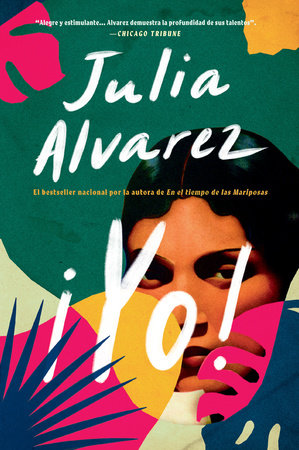Yo! (Spanish Language Edition) Reader’s Guide
By Julia Alvarez


INTRODUCTION
Yolanda Garcia’s—Yo for short—wildly successful first novel makes “characters” of her family, friends, and lovers. While Yo basks in the spotlight, her loved ones find their naked and very recognizable selves dangling in the same blinding light. The result? The “fictionally victimized” want to tell their side of the story.
And so they do in this novel about the collisions of art and reality, intellect and emotion, American acculturation and Alvarez’s own Dominican Republic roots. Yo’s three sisters, her Mami and Papi, grandparents, tias, tios, cousins, and husband take center stage to tell their version of the truth about Yo, and, in doing so, tell their own stories as well. Playing in the word yo, the Spanish word of ‘self’, Alvarez takes the role of storyteller away from the novelist, making her the character in others’ stories.
¡Yo! is a full exploration of a woman’s soul, a mediation on the writing life, and a search for identity and place in the world.
Julia Alvarez is originally from the Dominican Republic, but emigrated to this country with her parents at the age of 10. She is the author of four novels: How the García Girls Lost Their Accents, In the Time of the Butterflies, ¡Yo!, and In the Name of Salomé. She has also published four books of poems, including: Homecoming and The Other Side; a book of essays,Something to Declare; three books for young readers, The Secret Footprints (picturebook), How Tía Lola Came to Stay (for middle readers), and Before We Were Free (for young adults); as well as A Cafecito Story, a “green” fable based on a sustainable farm-literacy project she and her husband, Bill Eichner, have set up in her native country. She is also currently a writer-in-residence at Middlebury College
The name “Yo” is a play on the Spanish word for “self”. She is sort of the centering point of view in How the Garcia Girls Lost Their Accents and she plays the role of the storyteller. It seemed appropriate, then, to turn the table on her and see what stories others tell about her, so make her the subject. Turning the table on the storytellers. It is like a Rorschach test. It has everything to do with you are and not what’s on the page. So what I’m doing is letting the others get to tell their own stories, making the others the speakers. I like to tell people that it is a novel that is a meditation on narrative. It’s a meditation on what stories are for, what they do, what our responsibility is, what we owe each other. There are no answers, of course, but that’s what goes through my head.
What are you working on now?
I just came back from a book tour with a new young adult title, Before We Were Free. Thee work was the second part of “book biz”, as opposed to writing; the promoting and visiting bookstores and meeting readers, which is the best part. Basically introducing it to the world. Now, coming home, I’m working on a book of poems. And on finding an illustrator for a picture book for children, The Legend Of Altagratia, that’s already written.
Just for joining you’ll get personalized recommendations on your dashboard daily and features only for members.
Find Out More Join Now Sign In